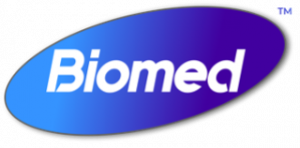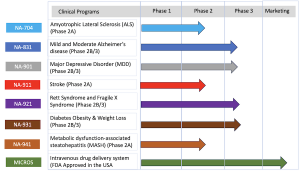Biomed Industries, Inc. Presents the First Phase 3 Combination Therapy Clinical Trial Protocol for Alzheimer’s Disease
Biomed Industries, Inc. Presents the First Phase 3 Clinical Protocol of Combination Therapy of NA-831 and Lecanemab for the Treatment of Alzheimer's Disease
The paper, entitled "Phase 3 Clinical Protocol: Placebo-Controlled, Double-Blind, Parallel-Group Study to Assess the Safety and Efficacy of NA-8311 in Combination with Lecanemab in Subjects with Early Alzheimer's Disease," captured significant attention at the conference as the first study of its kind to be proposed.
Lecanemab, an FDA-approved drug for early-onset Alzheimer’s disease, is being paired with NA-831, an experimental drug that demonstrated safety and efficacy in Phase 2 clinical trials for patients with early Alzheimer's disease.
Alzheimer's patients are often treated with multiple medications to address cognitive impairment (standard-of-care) and other comorbidities. Current treatments focusing on amyloid reduction have shown only modest improvements in clinical deterioration, underscoring the urgent need for additional therapeutics to enhance patient quality of life. Notably, serious side effects of recently approved drugs, such as amyloid-related imaging abnormalities (ARIA), which manifest as brain swelling and bleeding, highlight the necessity for dose-sparing with new combinations.
NA-831, an orally administered small molecule drug, showed significant improvement in a Phase 2 randomized double-blind placebo-controlled trial. Mild Cognitive Impairment (MCI) patients and those with mild to moderate AD exhibited an average ADAS-Cog-13 score improvement of 3.4 and 4.1 points, respectively, compared to the placebo after 24 weeks of treatment. NA-831 was well-tolerated at a dosage of 30 mg/day, with no serious adverse events reported.
“It is time to address both the underperformance of current AD drugs on the market and their serious side effects by seeking new treatment modalities,” said Dr. Lloyd Tran, CEO of Biomed Industries. “We believe that by significantly reducing the dosage level of anti-amyloid drugs and leveraging the promising cognitive benefits of NA-831, we can offer new hope to patients suffering from this devastating disease.”
At the AAIC 2024, Biomed also presented four other research papers:
1. Amyloid Hypothesis: A Critical Review of 20 Years of Alzheimer’s Research and the Need for New Approaches.
2. Phase 2 Clinical Trials of NA-831: Supporting the Neurogenesis Hypothesis in Treating Alzheimer’s Disease and Major Depressive Disorder.
3. Associations Between Alzheimer’s Disease and Obesity: Clinical Studies on NA-831 for AD and NA-931 for Obesity.
4. Associations Between Alzheimer’s Disease and Stroke: Clinical Studies on NA-831 for AD and NA-911 for Stroke.
Michael Willis, VP of Business Development, stated, “Biomed’s robust Phase 2 and Phase 3 pipeline spans Alzheimer’s Disease, ALS, Major Depressive Disorder, Rett Syndrome, Stroke, Obesity, and Liver Disease MASH. Our pioneering efforts in integrating human and artificial intelligence expedite drug discovery to meet patient needs.”
About Biomed Industries, Inc.3:
Biomed Industries, Inc. is a pioneering bio-pharmaceutical company dedicated to developing and commercializing novel drug therapeutics to address unmet medical needs. The company's research team has developed a new platform of drugs targeting Alzheimer’s disease, ALS, Traumatic Brain Injury, Major Depressive Disorder (MDD), Diabetes Obesity, MASH, Stroke, and rare diseases, including Rett Syndrome.
For further information, please visit Biomed Industries' official website: https://www.biomedind.com
CONTACT
Michael Willis
Biomed Industries, Inc.
San Jose, CA 95131 USA
Tel. 800-824-5135
Email: media@biomedind.com
Lloyd L. Tran
Biomed Industries, Inc.
+1 800-824-5135
email us here
Visit us on social media:
X
LinkedIn
WATCH NOW: Biomed introduction video at https://www.youtube.com/watch?v=lrC_tFafaSM

1 https://www.biomedind.com/NA-831.html
2 https://www.biomedind.com/pipeline.html
3 https://www.biomedind.com/about.html



